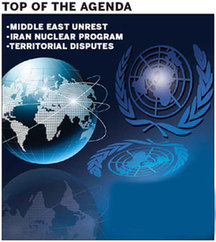Tough talking set to dominate UN meeting
|
The General Assembly is the main deliberative, policymaking and representative organ of the United Nations. Comprising all 193 members of the UN, it provides a unique forum for multilateral discussion of the full spectrum of international issues covered by the UN Charter. Liu Lunan / China Daily |
Disputes and conflicts will dominate the annual summit of world leaders at a busy UN General Assembly starting on Tuesday amid Middle East turmoil and territorial disputes in Asia.
More than 120 presidents, prime ministers and monarchs will meet this week at the general debates and sideline meetings of the 67th session of the UN General Assembly in New York.
The Syrian crisis, Iran's nuclear program and territorial disputes in Asia are expected to be on the top of the gathering's agenda, while The Associated Press said the mood as this year's UN gathering begins is one of disappointment and frustration.
The 18-month-old Syrian conflict will be "foremost" in everyone's mind, said UN Secretary-General Ban Ki-moon.
Lakhdar Brahimi, the new UN-Arab League envoy, is scheduled to brief the UN Security Council on Monday on recent talks with Syrian President Bashar al-Assad.
The Security Council is also due to hold a ministerial meeting on Wednesday on links with the Arab League, where Syria will dominate the proceedings.
Zhang Xiao'an, vice-president of the United Nations Association of China, said that the annual debate provides an opportunity for its members to illustrate their stances, but no breakthroughs are expected to be made unless related resolutions are proposed or passed.
"Change in the Arab world" will also be uppermost in the minds of the leaders after the region saw a series of leadership changes over the year and recent anti-Western protests triggered by the US-made film Innocence of Muslims.
Egyptian President Mohammed Morsi, an Islamist who was sworn in on June 30, will address the 193-member assembly for the first time on Wednesday, as will Yemeni Abd Rabbuh Mansur al-Hadi, who took office in February.
Another issue looming large over the summit is Iran's nuclear program. Israel is convinced that the Iranians are close to developing a nuclear weapon - which Teheran denies.
Iranian President Mahmoud Ahmadinejad, who will step down next year, will make his final speech to the General Assembly on Wednesday.
During a meeting on Sunday, Ban warned Ahmadinejad of the dangers of incendiary rhetoric and urged Iran to take the measures necessary to build international confidence in the exclusively peaceful nature of its nuclear program.
Last year, Palestinian leader Mahmoud Abbas was in the spotlight with his submission of an application for Palestine to become the 194th member state of the UN.
The United States, Israel's closest ally, made clear that it would veto any application until the Palestinians and Israelis negotiate an end to their decades-long conflict.
On Thursday, Abbas is expected to come to the General Assembly with another proposal - to upgrade Palestine's current status as a UN observer to a non-member observer state.
The meeting also comes amid regional tension in Northeast Asia. China-Japan relations hit their lowest point in years since Japan's "purchase" of parts of the Diaoyu Islands on Sept 10, which sparked mass protests across China.
Foreign Minister Yang Jiechi will lead a delegation to attend the debate, to present China's views on the current international situation as well as major international and regional issues, according to the Foreign Ministry.
Koichiro Gemba, his Japanese counterpart, is seeking to have a talk with Yang on the sidelines, possibly on Wednesday, in a bid to begin patching up frayed relations, according to a Kyodo News report.
Japanese Prime Minister Yoshihiko Noda, who is reluctant to directly talk with Beijing about the islands, aims to gain support over the territorial disputes from the international community during the summit, said Feng Wei, a specialist on Japanese studies at Fudan University in Shanghai.
Tokyo believes direct negotiations with Beijing will show a sign of compromise, since it claims that there is absolutely no territorial dispute over the Diaoyu Islands, he said.
Dong Fangyu, AP and AFP contributed to this story.
zhaoshengnan@chinadaily.com.cn



















